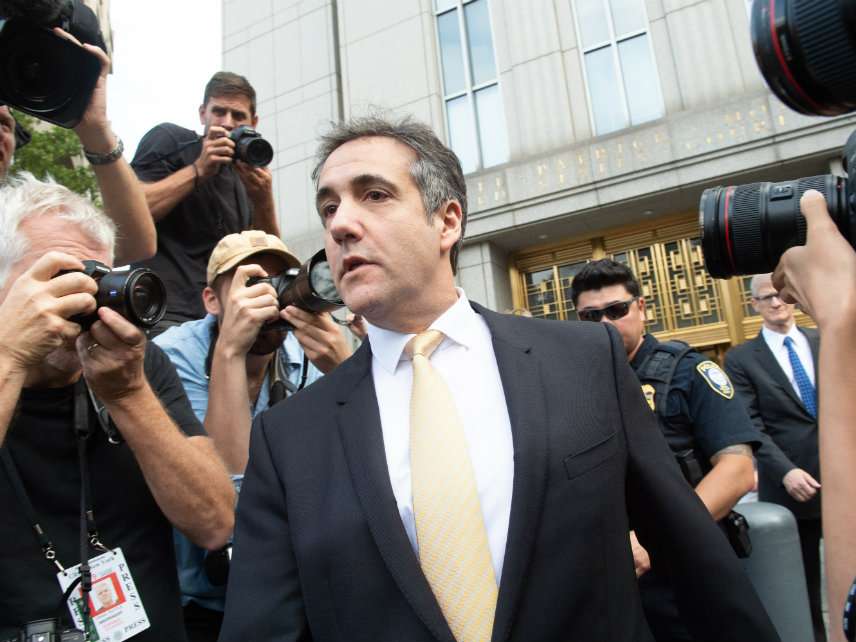Michael Cohen and Paul Manafort Are a Reminder That Donald Trump Surrounds Himself With Crooks
It's no surprise that the president's has shady associates. It's still damning.

Donald Trump surrounds himself with crooks.
Yesterday's twin news—that Trump organization fixer Michael Cohen had confessed in court to multiple crimes including violating campaign finance law, and that Trump campaign chair Paul Manafort was found guilty on eight counts of bank fraud and other financial crimes—mostly serves to reinforce what we've known, or at least suspected, for awhile now. Trump, the real estate swindler who played a fake businessman on a reality TV show, liked to surround himself with a cast of shady characters. It did not take a psychic to see yesterday's news, or something like it, coming.
If there was anything like a revelation in yesterday's events, it was that Cohen implicated Trump in his scheme, saying that his illegal payoff of Stormy Daniels was done in coordination with a "candidate" and members of a campaign. Cohen did not explicitly name Trump, but there is only one candidate in this story, and he is now our president. Cohen, and his lawyer Lanny Davis, are all but suggesting that Trump is an unindicted co-conspirator in a criminal act. ("If those payments were a crime for Michael Cohen, then why wouldn't they be a crime for Donald Trump?" Davis tweeted.)
Trump has responded by turning on Cohen, the close associate he publicly defended as recently as April, tweeting that he would "strongly suggest that you don't retain the services of Michael Cohen." (Another non-surprise: There is no honor amongst fixers and campaign finance violators.) Trump's recommendation has the virtue of being good advice. But it is good advice that Trump himself did not follow.
Does it matter that this was a campaign finance violation? After all, just a few years ago, Barack Obama's 2008 campaign was hit with a $375,000 fine for errors in its own campaign finance reporting. In one sense, the history is useful to consider in that it suggests the prevalence of campaign finance violations. Spend enough time looking, and you might find related violations on nearly any large campaign.
In another sense, however, it's beside the point. The actions that Cohen took at the alleged direction of Trump were deliberately designed to deceive—not just the government, but, as The Atlantic's Conor Friedersdorf writes, the electorate. There were intended, according to Cohen's statement, to influence the outcome of the election. Even if you don't believe this should be treated as a crime, it remains a lie crafted to manipulate voters.
Yet that, too, is no surprise. Trump lies, repeatedly, about almost everything. His height. His steaks. His knowledge of the very hush-money payments that Cohen claims he made at Trump's direction. Trump is not exactly known for painful honesty.
Trump is who we thought he was. The Manafort and Cohen news only offers further confirmation. The fundamental lack of surprise, the sense that this was inevitable and that nothing has really changed, is likely to drive much of the political reaction—or lack thereof—going forward.
Yes, it's true that Trump is not a particularly popular president, but Trump remains quite popular with Republican voters—and Republican voters elect Republican members of Congress. As long as Republicans maintain congressional majorities beholden to a Trump-loyal voter base, it's unlikely that we'll see much of a response from the GOP. As Reason's Jesse Walker noted last night, this is a legal matter, but it will play out entirely along political lines.
Indeed, Trump and his defenders are already dismissing the Cohen case as beside the point. Neither Cohen nor Manafort should have broken the law, but what they did was irrelevant to the larger question at hand, which is Special Counsel Robert Mueller's investigation into Russian election interference.
That's true for the moment, but perhaps not for long. Cohen's lawyer said last night that Cohen would be willing to tell Mueller "all that he knows" about the Trump campaign—including "knowledge about the computer crime of hacking and whether or not Mr. Trump knew ahead of time about that crime and even cheered it on." Granted, Cohen may not be the most trustworthy source, but then, when the subject is Trump, not-very-trustworthy sources are what you have. It's unlikely that this story will end here.
But if it did, the most straightforward lesson would be one we already know all too well: The president surrounds himself with crooks. Maybe that doesn't matter. Maybe it won't. But it should.


Show Comments (422)